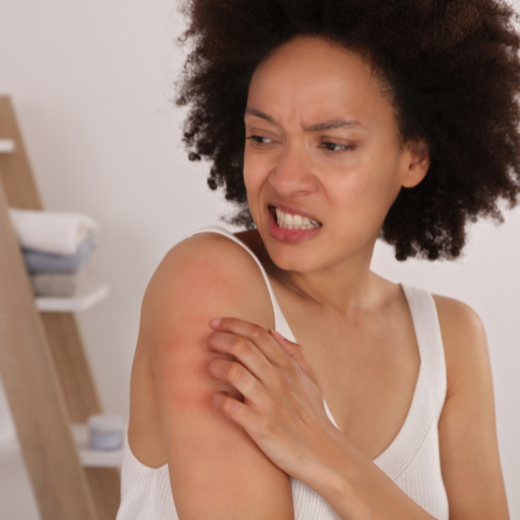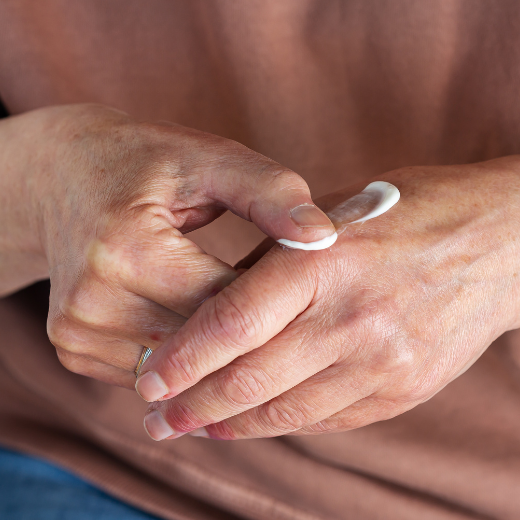Your Top Questions About Skin Allergies, Answered
Posted by Nikki Wisher on Aug 22nd 2023
Do you ever feel like your skin type is tough to nail down? Some days it’s red and irritated, other days it’s smoother and clearer…what gives? You might actually have a skin allergy. In fact, skin allergies as extremely common and they can look a lot different from the outbreak of hives or sudden and severe swelling you’re probably picturing. To spread some essential knowledge, I’m answering some of the most common skin allergy questions.
What Causes Skin Allergies?
An allergic reaction happens when your overachiever immune system sees a harmless material or substance and misinterprets it as a threat. Your immune system then triggers a reaction to fight this reverse Trojan horse, and that reaction causes symptoms like inflammation, swelling, rash, hives, and so on.
While we know what causes an allergic reaction, the question of what causes people to have allergies isn’t as clear. Researchers haven’t been able to determine why some people develop allergies and others don’t, or why people develop allergies to the specific allergens they do.
I Would Know if I Had a Skin Allergy, Right?
Possibly the most common misconception people have about allergies is that you either have an allergy for your entire life or you don’t. In reality, allergies can come and go at any point in your life. On top of that, skin allergies often go undiagnosed because they’re not as noticeable or identifiable as, say, a food allergy that causes your throat to swell. You might just notice that your skin seems to get red when you use a particular skin care product without realizing that you’re actually allergic to one of the ingredients.

What Does a Skin Allergy Look Like?
The tricky thing about a skin allergy is that the allergic reaction can look so different from one person to the next. In some cases, it’s very obvious: you get an outbreak of hives or a very strong and clear rash in one area. In other cases, your skin might just get a bit red and inflamed, or you might have swelling but you may just blow it off as your face being puffy that day.
What Are the Most Common Skin Allergens?
Most of the time, a skin allergy happens when your skin comes into contact with a particular allergen. Some of the most common topical allergens include:
- Latex
- Pet dander
- Poison ivy and poison oak
- Pollen
- Nickel
- Certain medications
- Hot or cold temperatures
- Certain food items
- Dust mites
- Sunlight
But some types of skin allergies can be triggered by internal allergens. Eczema, for example, is categorized as a form of skin allergy and its symptoms can flare up because of topical allergens as well as stress, viruses, and so on.
What Should I Do if I Believe I Have a Skin Allergy?
If you think you might have a skin allergy, it’s generally best to schedule an appointment with a dermatologist. Keep notes about your allergic reactions and what you were in contact with when they happened to see if you or your dermatologist can spot a pattern that could tell you what your allergens are. The doctor might also recommend allergy testing to get a clear answer about what your allergens are.
In the meantime, you can keep your skin happy by avoiding your suspected allergens and following these tips:
- Choose Sensitive Skin Care Products: Even
if you haven’t needed products for sensitive skin in the past, your allergy
makes your skin more likely to react to a variety of ingredients…especially if
you aren’t sure what you’re allergic to. Products for sensitive skin, like
those in the popular PCA Skin
Sensitive Skin Mini Kit, are designed to omit common irritants like
fragrances.
- Have Soothing Skin Care Products Available: Pick up some products that can soothe your skin when it gets irritated. While allergic reactions fade with time, calming skin care products can help you minimize the reaction faster.
- Choose Hypoallergenic Pillowcases and More: If you have skin allergies, skin care products aren’t the only items that could trigger a reaction. Think about other items that touch your face on a regular basis, like pillowcases and towels, and replace them with hypoallergenic products.

Keeping Your Skin Comfortable and Healthy
Skin allergies can be tricky to define, and you might not be able to live your life without any more allergic reactions. But with the tips above and help from your dermatologist or allergist, you could keep your reactions to a minimum and give your skin more days to look and feel its best.

